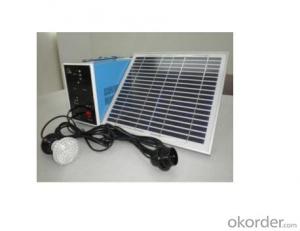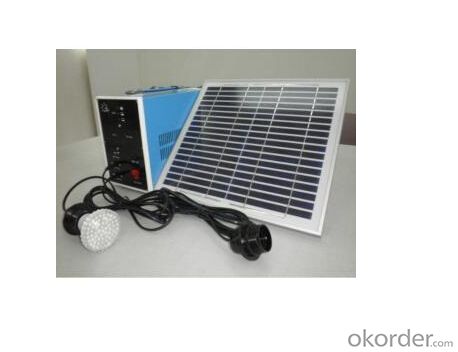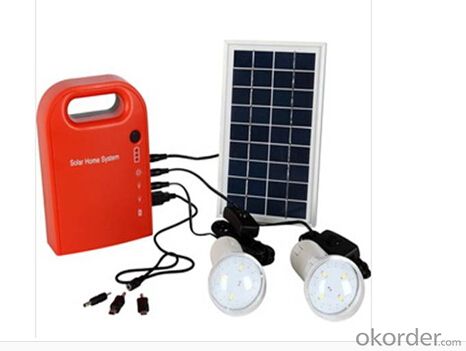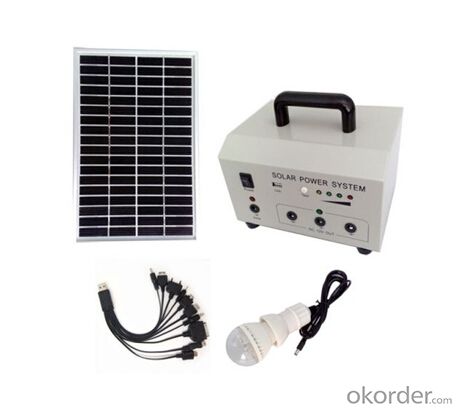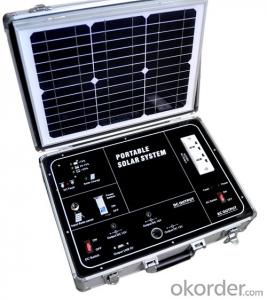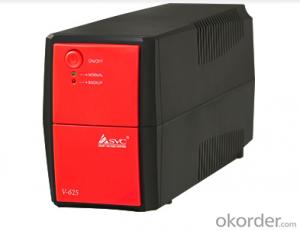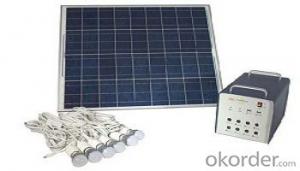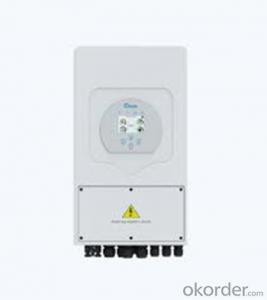CNBM Solar Home System Roof System Capacity-15W
- Loading Port:
- Shanghai
- Payment Terms:
- TT or LC
- Min Order Qty:
- 5 unit
- Supply Capability:
- 30000 unit/month
OKorder Service Pledge
OKorder Financial Service
You Might Also Like
Introduction of Solar Home System
Solar Home System is quite suitable product in urban area and the place which is short of electricity. Our Small Solar Home System own great benifits compare with other kind electricity resources:
Electricity generating cost of Solar Home System is much cheaper than diesel engine. Beside low electricity making cost, solar system products also have the features of noiseless, clean energy, environmentally friendly and can access to many different electric appliance.
Working Principle of Solar Home System
The stand alone Solar Home System is an off-grid solar system which uses batteries to store the solar energy. Stand alone solar system solutions design for those who are not able or willing to connect to electricity grid.
However, our on-grid solar home system can be connected to the grid for utilization of grid electricity power. Our solar system can add relative equipment as our customer’s requirement which have the function of switching to city electricity automatically. The solar system can use battery power in priority, if sunshine is not so good or loads consumption is too high which cause battery power insufficient. Then system can switch automatically to grid power supply. Meanwhile, the system can charge the batteries with grid power until batteries are fully charged. Then the solar system will switch back to battery power supply.
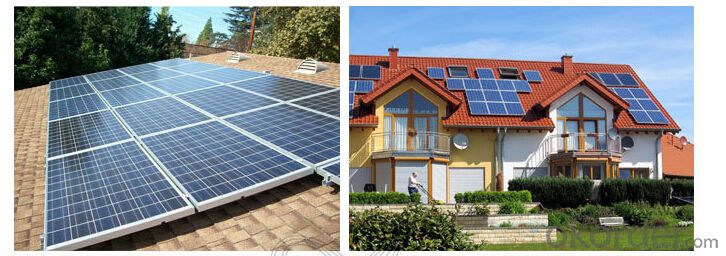


Specification of Solar Home System
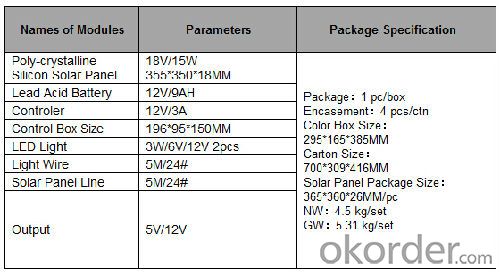
Advantage of Our Solar Home System
1 Excellent Performance: Our Solar Home System is composed by Brand Standard Kits with high quality. Our solar system has the advantage of high efficiency and stable operation. We can ensure our product with a long life period.
2. Small Orders Accepted: We can accept small orders as our customer’s trial order.
3. Warehouse: We have warehouse overseas which can bring great convenience to our customer to pick up the products.
FAQ
Q: Could you introduce the background of your company?
A: We are a Group corp. with 1GW capacity in China, which is Okorder’s registered VIP Supplier, possess Financial Service from Okorder.com.
Q: Required mainly certificates (CE&IEC/TUV/RoHS)?
A: Our products are certificated by CE RoHS, IEC, ISO, TUV, UL etc.
Q: Your main exported market is?
A: Main markets of our products is: South-east Asia, Mid-east, Arica, East Europe and Latin America.
- Q:What is the role of solar-powered water purification systems in providing clean drinking water?
- Solar-powered water purification systems play a crucial role in providing clean drinking water by harnessing the energy of the sun to remove harmful contaminants and pathogens from water sources. These systems use solar panels to generate electricity, which powers the purification process, making them environmentally friendly and cost-effective. They are especially valuable in remote or off-grid areas where access to clean water is limited. Additionally, solar-powered water purification systems are easy to maintain, making them a sustainable solution for ensuring clean and safe drinking water for communities worldwide.
- Q:Can solar energy systems be used in powering retirement homes or assisted living facilities?
- Yes, solar energy systems can definitely be used to power retirement homes or assisted living facilities. Solar panels can be installed on the roofs or in open spaces of these facilities to capture sunlight and convert it into electricity. This renewable energy can then be used to power various amenities such as lighting, heating, cooling, and appliances, reducing their reliance on traditional power sources and lowering energy costs. Additionally, solar energy systems are environmentally friendly and sustainable, aligning with the growing trend of integrating green solutions in retirement homes and assisted living facilities.
- Q:Can solar energy systems be installed on roadways?
- Yes, solar energy systems can be installed on roadways. Solar roadways, also known as solar panels or solar tiles installed on roads, have been developed to generate electricity from sunlight. These systems have the potential to harness solar energy and convert it into usable electricity, helping to power streetlights, traffic signals, and even nearby buildings. However, the practicality and efficiency of solar roadways are still being researched and tested.
- Q:Are there any risks of electromagnetic interference with solar energy systems?
- Yes, there are potential risks of electromagnetic interference (EMI) with solar energy systems. EMI refers to the disturbance caused by electromagnetic radiation that can disrupt the proper functioning of electronic devices. Solar energy systems, which consist of various electronic components, can be susceptible to EMI from external sources. One common source of EMI is radio frequency interference (RFI) caused by nearby radio or television transmitters, radar systems, or wireless communication devices. These can emit electromagnetic waves that may interfere with the operation of solar energy systems. The interference can result in reduced power output, decreased efficiency, or even complete system failure. Another potential source of EMI is power line interference. Solar energy systems are typically connected to the electrical grid, and fluctuations or disturbances in the grid's electrical signals can introduce interference in the system. This can be caused by nearby power lines, electrical substations, or other electrical equipment. To mitigate the risks of EMI, solar energy systems are designed and installed with measures to minimize interference. This includes using shielded cables, grounding techniques, and adequate spacing between components to reduce the impact of external electromagnetic fields. In addition, solar inverters, which convert the DC power generated by solar panels into AC power, are often equipped with EMI filters to prevent interference from affecting the system's operation. It is important for solar energy system installers and manufacturers to comply with relevant safety standards and regulations to ensure the systems are resistant to EMI. Regular maintenance and inspections can also help identify and address any potential EMI issues. Overall, while the risks of EMI exist for solar energy systems, proper design, installation, and maintenance practices can significantly minimize the impact and ensure the reliable and efficient operation of these systems.
- Q:Can solar energy systems be used in areas with limited access to education?
- Yes, solar energy systems can be used in areas with limited access to education. Solar energy systems are relatively simple and can be easily installed and maintained with basic training, making them accessible to communities with limited education resources. Additionally, the use of solar energy can help address energy poverty and improve the quality of life in these areas by providing clean and affordable electricity for lighting, heating, and powering essential devices.
- Q:Can solar energy systems be used for charging electric vehicles?
- Yes, solar energy systems can be used for charging electric vehicles. Solar panels can be installed on rooftops or in open spaces to harness sunlight and convert it into electricity. This electricity can then be used to charge electric vehicle batteries, providing a sustainable and renewable source of energy. Additionally, with advancements in technology, solar-powered charging stations are being developed to further facilitate the use of solar energy for electric vehicle charging.
- Q:Can solar energy systems be used for powering construction or building sites?
- Yes, solar energy systems can definitely be used for powering construction or building sites. Solar panels can be installed on rooftops, open spaces, or even on temporary structures at the site to capture sunlight and convert it into electricity. This renewable energy source can provide a reliable and sustainable power supply to run tools, equipment, lighting, and other electrical needs on construction sites, reducing the reliance on fossil fuels and minimizing environmental impact.
- Q:Can solar energy be used for industrial processes?
- Yes, solar energy can be used for industrial processes. Solar thermal technology can be employed to generate high-temperature heat required for various industrial applications such as heating, drying, melting, and even powering steam turbines for electricity generation. Additionally, photovoltaic systems can provide renewable electricity to power industrial machinery and equipment. The use of solar energy in industrial processes can help reduce greenhouse gas emissions and dependence on fossil fuels, making it a sustainable and environmentally friendly option.
- Q:Can solar energy systems work during cloudy or rainy days?
- Solar energy systems can still work during cloudy or rainy days, although their efficiency may be reduced. While direct sunlight is the most effective way to generate solar energy, even diffused sunlight on cloudy or rainy days can still produce a certain amount of electricity.
- Q:Are solar energy systems suitable for agricultural applications?
- Yes, solar energy systems are highly suitable for agricultural applications. They provide a clean and renewable source of power that can be used to meet the energy needs of various agricultural activities such as irrigation, crop drying, and powering electric fences. Solar energy systems are cost-effective, environmentally friendly, and can be easily installed in rural areas, making them an ideal choice for farmers and agricultural businesses.
1. Manufacturer Overview |
|
|---|---|
| Location | |
| Year Established | |
| Annual Output Value | |
| Main Markets | |
| Company Certifications | |
2. Manufacturer Certificates |
|
|---|---|
| a) Certification Name | |
| Range | |
| Reference | |
| Validity Period | |
3. Manufacturer Capability |
|
|---|---|
| a)Trade Capacity | |
| Nearest Port | |
| Export Percentage | |
| No.of Employees in Trade Department | |
| Language Spoken: | |
| b)Factory Information | |
| Factory Size: | |
| No. of Production Lines | |
| Contract Manufacturing | |
| Product Price Range | |
Send your message to us
CNBM Solar Home System Roof System Capacity-15W
- Loading Port:
- Shanghai
- Payment Terms:
- TT or LC
- Min Order Qty:
- 5 unit
- Supply Capability:
- 30000 unit/month
OKorder Service Pledge
OKorder Financial Service
Similar products
New products
Hot products
Hot Searches
Related keywords
